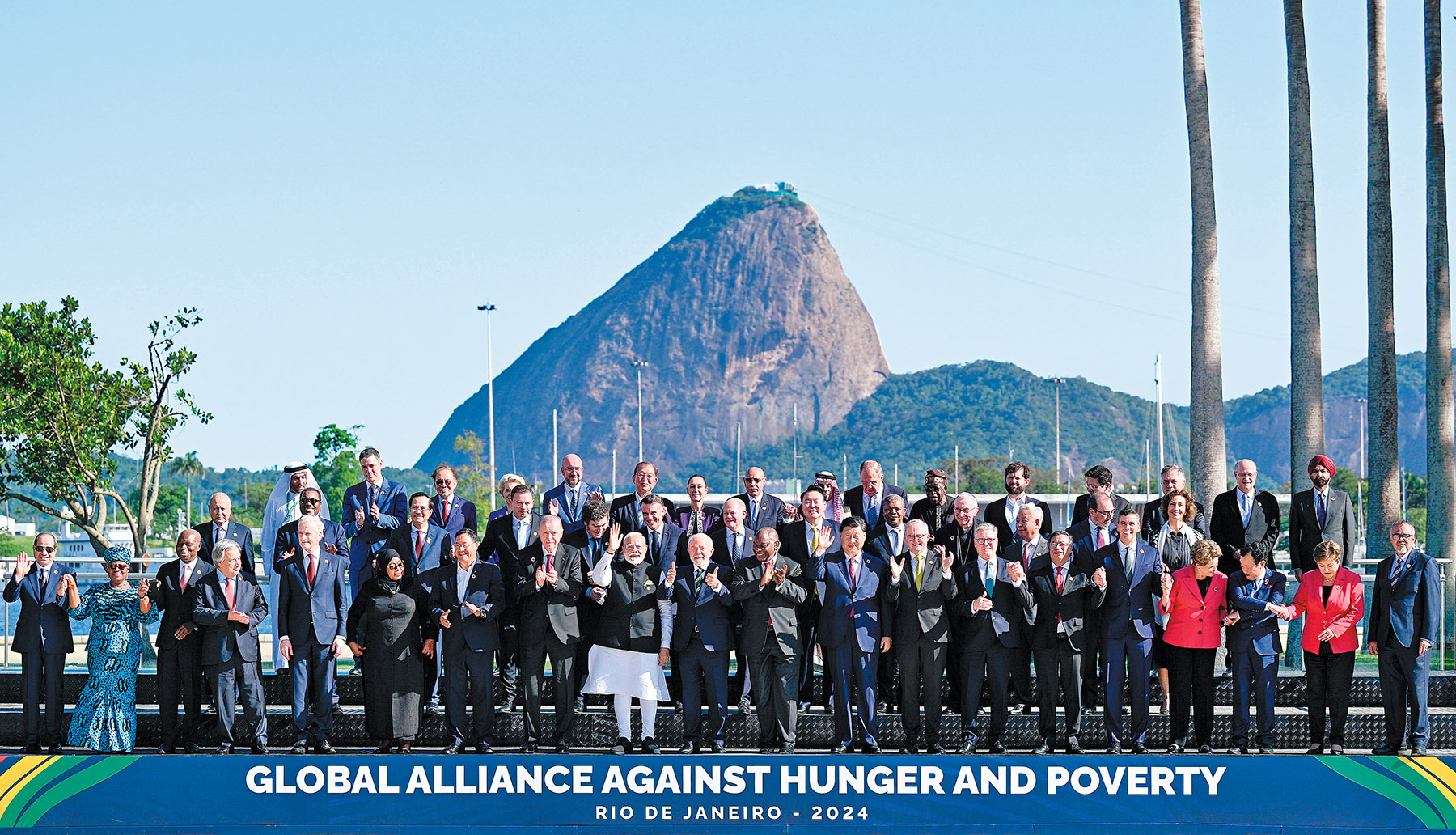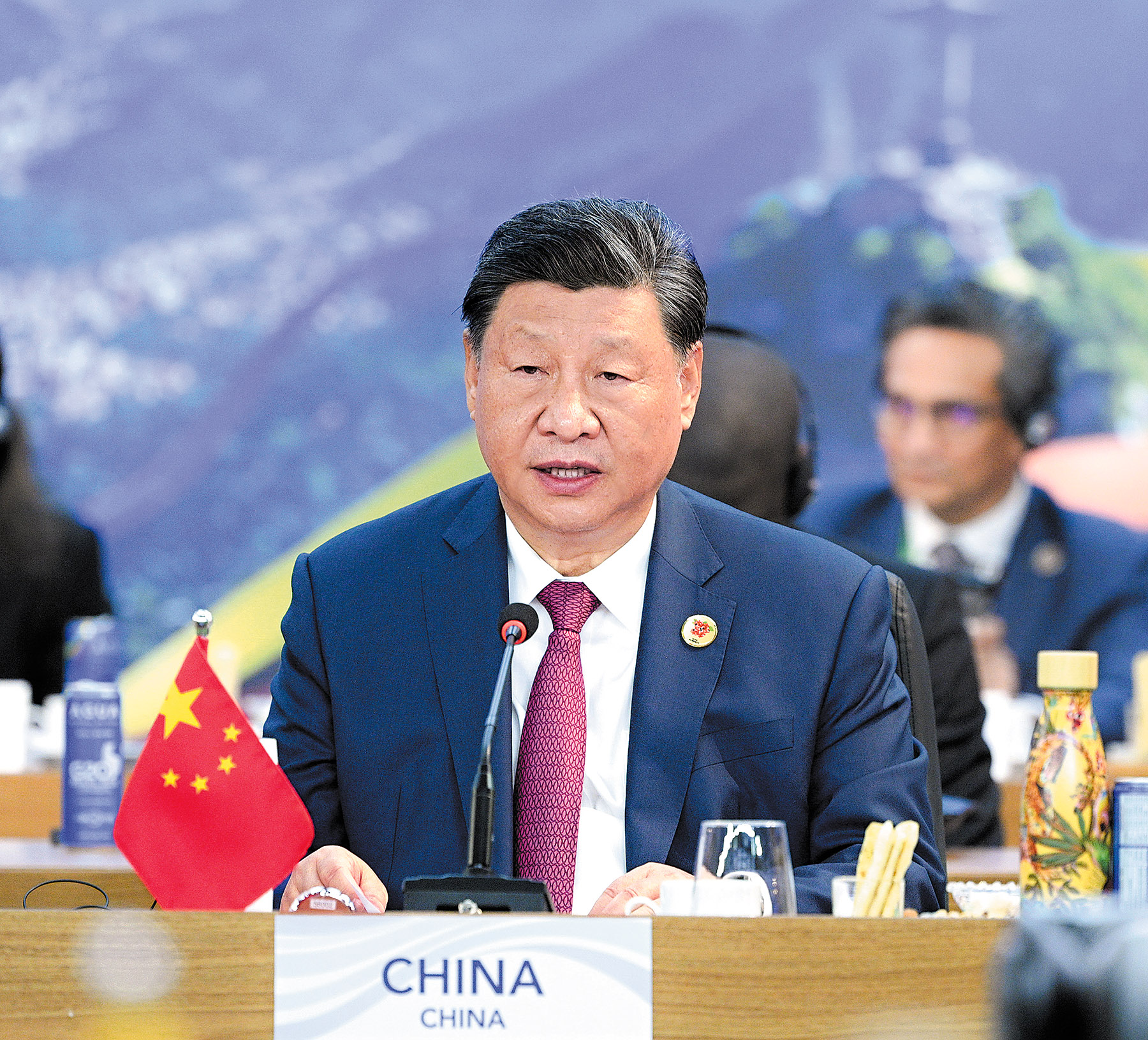President shares nation's key experience in poverty alleviation with other world leaders at G20 Summit

President Xi Jinping unveiled China's eight major actions to shore up global development at the first session of the 19th G20 Summit on Monday morning, calling for more "bridges of cooperation" and less "small yard, high fences" to support the modernization of developing nations.
Speaking to a roomful of world leaders at the Museum of Modern Art in Rio de Janeiro, Brazil, the president stressed the need to channel more resources into fields such as trade, investment and development cooperation, as well as to strengthen development institutions, in order to build a just world of common development.
The session, chaired by Brazilian President Luiz Inacio Lula da Silva, also marked the launch of the Global Alliance Against Hunger and Poverty, which has already been endorsed by 82 countries, 26 international organizations and nine financial institutions.
READ MORE: China to practice true multilateralism with G20 members, says ministry
Xi told the session on the first day of the two-day summit that China "will always be a member of the Global South, a reliable long-term partner of fellow developing countries, and a doer and go-getter working for the cause of global development".
As part of the eight actions outlined by the Chinese president, China will pursue highquality Belt and Road cooperation and implement the Global Development Initiative, with efforts including the advancement of the multidimensional Belt and Road connectivity network and proper development of its Global South research center.
Beijing has so far added 700 billion yuan ($96.7 billion) to financing windows and injected another 80 billion yuan into the Silk Road Fund to support Belt and Road cooperation, with over 1,100 development projects put into operation to support the GDI, Xi said.
He also reaffirmed the nation's pledge to help with the development of Africa, including a funding commitment of 360 billion yuan for partnership actions with the continent on the modernization drive.
China, alongside Brazil, South Africa and the African Union, is proposing an Initiative on International Cooperation in Open Science, in order to help the Global South gain better access to global advances in science, technology and innovation, he said.
He also extended support to the G20 in carrying out pragmatic cooperation for the benefit of the Global South and the implementation of the G20 Anti-Corruption Action Plan.
He added that the nation will continue with its high-standard opening-up and unilaterally open its doors wider to the least-developed countries, noting that China's imports from other developing countries are likely to surpass $8 trillion from now through 2030.

Xi called for greater support to developing countries in building a just world of common development, including strengthened efforts in facilitating their green development and establishing an open, inclusive and nondiscriminatory environment for international economic cooperation.
"We should promote universally beneficial and inclusive economic globalization, energize sustainable development with new technologies, new industries and new business forms, and support developing countries in better integrating in digital, smart and green development to bridge the North-South gap," he emphasized.
The Chinese president made a strong case for upholding multilateralism, highlighting the need to remain committed to the United Nations-centered international system, the international order underpinned by international law, and the basic norms of international relations based on the purposes and principles of the UN Charter.
Zhu Jiejin, a professor at Fudan University's School of International Relations and Public Affairs, highlighted the significance of China's action plans for global development, particularly as uncertainties loom over the future of the G20.
"The leadership capacity of the Global South is more crucial than ever, which will determine the future direction of the G20. China's initiatives are pivotal in uniting the Global South," he said.
Xi also announced Beijing's decision to join the Global Alliance Against Hunger and Poverty, saying that the nation will remain a committed host of the International Conference on Food Loss and Waste.
He shared with other leaders China's key experience in lifting 800 million people out of poverty and meeting the targets for poverty reduction in the UN 2030 Agenda for Sustainable Development ahead of schedule.
"This achievement ... is the fruit of the strenuous, unified efforts of the Chinese government and people," he said, adding that China always places the people front and center, and it solemnly declares that "not a single poor region or person should be left behind".
"China's story is proof that developing countries can eliminate poverty," Xi said. "If China can make it, other developing countries can make it too. This is what China's battle against poverty says to the world."
According to the World Bank, China's economic growth and poverty reduction efforts significantly lowered the global poverty rate from around 44 percent to approximately 9 percent.
ALSO READ: Next 'golden 50 years' expected in ties with Brazil
Zhu, the professor, said China serves as a model among developing nations for eliminating poverty and hunger, which are two major UN Sustainable Development Goals, thereby offering valuable lessons for the global community.
Brazilian President Lula highlighted the shared responsibility of the G20 economies, which account for around 85 percent of the world's GDP, 75 percent of global trade, and two-thirds of the world population, in putting an end to malnourishment across the globe.
"We coexist with a contingent of 733 million people still undernourished," he said at the session.
South African President Cyril Ramaphosa, whose country is set to assume the G20 presidency in December, called for doubled efforts to eliminate hunger and poverty.
"It is only through an integrated and comprehensive system of social support that we will be able to assist the most vulnerable in society," he said.
Zhao Jia and Li Shangyi in Beijing contributed to this story.


